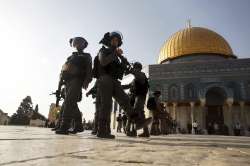Israel bar men under 50 from Friday prayers at holy site
Israeli police said they would bar men under 50 from Friday Muslim prayers at a sensitive Jerusalem holy site after clashes erupted as Palestinians ended a boycott of the compound the previous day

Israeli police said they would bar men under 50 from Friday Muslim prayers at a sensitive Jerusalem holy site after clashes erupted as Palestinians ended a boycott of the compound the previous day.
"Security assessments were made and there are indications that disturbances and demonstrations will take place today," police said in a statement of the Haram al-Sharif compound, known to Jews as the Temple Mount.
"Only men over the age of 50 will be permitted and women of all ages are permitted. A number of roads around the Old City will be limited to access and all necessary security measures are being taken to prevent and to respond to any outbreak of violence."
The site includes the Al-Aqsa mosque and the Dome of the Rock.
Yesterday, Palestinians ended a boycott of the site over new Israeli security measures there and entered for the first time in two weeks.
Thousands of worshippers streamed into the site yesterday afternoon. Clashes between Israeli police and Palestinians erupted soon after, with the Palestinian Red Crescent reporting around 100 people wounded.
Police spokesman Micky Rosenfeld said men under 50 would be barred from the site Friday following security assessments indicting Palestinians plan protests there. There are no restrictions on women.
Rosenfeld said some Palestinians barricaded themselves inside Al-Aqsa Mosque overnight in order to join protests later. Police removed them after they refused to leave, he said.
Friday prayers are the highlight of the Muslim religious week. Thousands of Muslims from around Israel and Palestinian areas typically worship at the holy compound in Jerusalem's Old City.
Tensions have been running high at the site Arab gunmen killed two police officers on July 14, prompting Israel to install metal detectors and other security devices.
The move outraged Muslims who claimed Israel was trying to expand its control over the site. Israel emphatically denied the allegations insisting the security measures were needed to prevent more attacks.
The issue sparked some of the worst street clashes in years and threatened to draw Israel into conflict with other Arab and Muslim nations.
Under intense pressure, Israel removed the metal detectors and said it planned to install sophisticated security cameras instead.
Muslims had been praying in the streets outside the shrine to protest the security measures since they were installed. They turned to pray at the sacred site Thursday after Israel removed them.
However, violence resumed as Palestinians gathering for prayers at the compound clashed with police.
Palestinian factions Fatah and the Islamic militant group Hamas both issued calls earlier this week for mass protests on Friday.
Palestinians had decided to end their boycott of the site after Israel removed the new security measures, including metal detectors, installed after an attack nearby killed two policemen on July 14.
(With agencies)